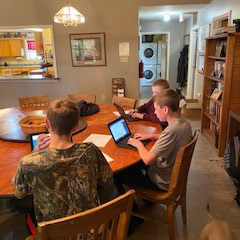Academics and Pandemics
This is a scary time to be parenting—literally, a time like no other. I have been in touch with a couple of the adoptive families I’ve worked with who now find themselves in the unimaginable position of raising large families and working from home while being cut off their support systems. Several families with four-plus kiddos are out there trying to homeschool and parent well during their “office hours.” I can’t imagine the struggle to balance keeping kids focused on some sort of academics and keeping their sanity.
Here’s some encouragement from a former houseparent, teacher and homeschool mom. As a new high school Chemistry teacher I went to a great conference where a leader asked, “When you envision your students in 10 years what do you want them to look like?” Most of the answers were things like “happy, healthy relationships, independent, lifelong learner, employed, morally centered.” Then the leader asked, “What do you do every day in your classroom to ensure they will be any of these things?” Wow! I decided then to look at my classroom differently, and I hope you can use some of these ideas to change your own “classroom.”
Instill felt safety. We know that kids can’t learn anything new, connect with others, or express themselves if they don’t feel safe; so, this is job number one. Maintain a sense of calm in their environment by having flexible routines and giving learning opportunities throughout the day. Remember to keep your kiddos well hydrated and well fed with nutrient-dense foods that combine protein with healthy carbs and fats.
Be their biggest cheerleader (and yours). Academics provide unique struggles for some kiddos who may be behind their peers in the same grade. Remember to take time to celebrate successes—even in non-traditional areas. If your first grader sorted your recipe ingredients into wet and dry, then congratulations to both of you! You just hit an English Language Arts state standard for Tennessee.
Learn anywhere and everywhere. Don’t limit yourself to a kitchen table for hours a day as this can be counterproductive for you and your children. Practice math facts with hopscotch, measure your walk and convert it into different units of measurement, compare this pandemic to other times in history (even biblical history), or start a garden. Consider learning styles, too. You may have that rare kid who enjoys spending time learning quietly, so remember to engage with him or her and show interest in the subject. It is also very easy to ignore the visual learner (who learns well by observation and reading) when you have four other kinesthetic learners (who learn well through activity and movement).
Use all your resources wisely. Countless videos, games and other media are labelled instructional; however, be careful not to use them as babysitters. Technology is a great jumping-off point to get ideas, but screens are no replacement for relationships. You have more instructional opportunities than you might realize. Let kids teach each other, have a book report day (and participate yourself), play games that involve logic, math or storytelling, make a timeline down the walls in the hall, offer science experiments or art projects weekly that you can all do together.
Be kind and forgiving to them and you! Fear and uncertainty are the emotions of the day; however, you have the power to speak words of life to your kids, to constantly point them to the only certainty in this life—Jesus, and to model the peace that passes all understanding He promises.
The truth is that no one is expecting you to do what a team of professional and licensed teachers do every day. Even though I taught in a high school classroom for years, my subject was Chemistry. I would not have been an effective English, French or elementary teacher, but keeping these ideas in mind may help you be the teacher your child needs.

